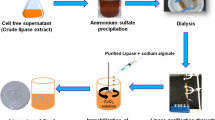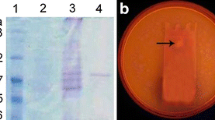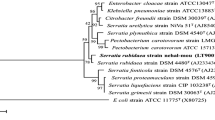The ability of an extracellular lipase from Pseudomonas aeruginosa KKA-5 to commence hydrolysis of castor oil in the presence of various metal chlorides, was investigated. Apart from CaCl2 (commonly used for castor oil hydrolysis), AlCl3 (group IIIB), CrCl3 (group VIA) and MgCl2 (group IIA) displayed enhanced hydrolysis capability. Specifically, our statistics show that with respect to time, when Cr3+ was used, hydrolysis of castor oil was four times faster than that of calcium, and 1.6 times faster with regards to Al3+. The chlorides of group VIII and alkali metals had no effect on hydrolysis. Group IV metal chlorides did not enhance lipase activity and inhibited castor oil hydrolysis. The effect of metal ions from other groups on lipase activity is also reported.
Similar content being viewed by others
Author information
Authors and Affiliations
Additional information
Received 14 August 1998/ Accepted in revised form 22 October 1998
Rights and permissions
About this article
Cite this article
Sharon, C., Nakazato, M., Ogawa, H. et al. Lipase-induced hydrolysis of castor oil: effect of various metals. J Ind Microbiol Biotech 21, 292–295 (1998). https://doi.org/10.1038/sj.jim.2900586
Issue Date:
DOI: https://doi.org/10.1038/sj.jim.2900586




